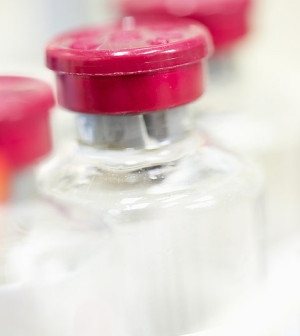- Could Artificial Sweeteners Be Aging the Brain Faster?
- Techniques for Soothing Your Nervous System
- Does the Water in Your House Smell Funny? Here’s Why
- Can a Daily Dose of Apple Cider Vinegar Actually Aid Weight Loss?
- 6 Health Beverages That Can Actually Spike Your Blood Sugar
- Treatment Options for Social Anxiety Disorder
- Understanding the Connection Between Anxiety and Depression
- How Daily Prunes Can Influence Cholesterol and Inflammation
- When to Take B12 for Better Absorption and Energy
- Epsom Salts: Health Benefits and Uses
Mars-Bound Astronauts May Face Danger From Cosmic Rays


Bad news for anyone hoping to travel to Mars: New research in rodents suggests that exposure to cosmic rays may impair the brain functioning of astronauts on missions to the red planet.
Researchers discovered that exposure to highly energetic charged particles — similar to those in the galactic cosmic rays that astronauts encounter on extended spaceflights — hurt the central nervous system and cause thinking problems in lab animals.
“This is not positive news for astronauts deployed on a two- to three-year round trip to Mars,” said Charles Limoli, a professor of radiation oncology at the University of California, Irvine School of Medicine.
“Performance decrements, memory deficits and loss of awareness and focus during spaceflight may affect mission-critical activities, and exposure to these particles may have long-term adverse consequences to cognition throughout life,” Limoli said in a university news release.
The researchers reached their conclusion by studying rodents exposed to charged particles at a NASA lab. The exposure led to inflammation in the brain and disrupted brain signaling, they said. As a result, the rodents performed worse on tasks requiring learning and memory.
Limoli, working on behalf of NASA’s Human Research Program, is among those investigating how space radiation affects astronauts. Learning how to mitigate those effects is essential to further space exploration, scientists say.
According to Limoli, travelers to Mars would face more trouble than those who work on the International Space Station because they’d face more galactic cosmic rays outside the protective magnetosphere of the Earth.
Spacecraft could be developed with better shielding, although there’s no way to fully escape the cosmic rays, he said. Drug treatments that are under development also might help, he noted.
The study appears in the May 1 issue of Science Advances.
More information
For more about the health effects of space travel, visit the U.S. National Aeronautics and Space Administration (NASA).
Source: HealthDay
Copyright © 2026 HealthDay. All rights reserved.










